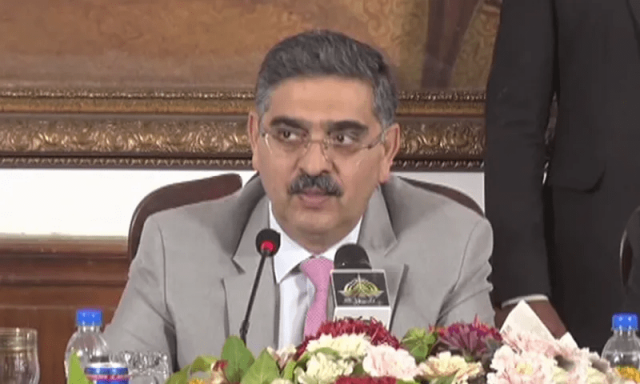Govt can ban anyone under the law, says Kakar
Caretaker PM urges rule of law, rejects violence, emphasises education and regional economic potential

Caretaker Prime Minister Anwarul Haq Kakar on Tuesday reiterated that under existing laws, the government has the authority to ban and terminate individuals or entities, clarifying that the government operates within the framework of law, neither portraying itself as villains nor heroes of human rights.
He underscored the importance of upholding the rule of law, rejecting any attempts to justify violence under the guise of human rights.
Speaking to students in Quetta, PM Kakar engaged in a comprehensive dialogue, addressing key issues ranging from education and youth empowerment to political stability, terrorism and immigration.
He addressed the formation of militias based on language, religion, and race, asserting that such actions lack justification and the Constitution did not allow it.
PM Kakar emphasised that the Constitution allows participation in National and Provincial Assembly elections to voice concerns and grievances without resorting to violence.
He highlighted the upcoming elections on February 8, urging citizens to engage in the democratic process by submitting nomination papers and expressing their views through legitimate political channels.Regarding violence, the caretaker prime minister asserted that the state will determine whether violence is justifiable or not.
He pointed to the actions of banned organisations, such as BLA and BLF, stating that their activities involve torture and killings. He underscored the government's responsibility to address violence and maintain law and order.
PM Kakar drew attention to incidents where human rights concerns were not widely raised, questioning the selective nature of such advocacy. He cited examples, including the recent murder of a young Baloch individual and the tragic burning of 15 people on the coastal highway.
He challenged the inconsistency in human rights responses, particularly in cases involving labourers from Rahim Yar Khan.
PM Kakar asserted that the government has the right to control the expression of information under the law. He acknowledged the freedom of expression for the media but emphasised that it is subject to legal constraints.
Drawing comparisons to figures like Osama bin Laden and Ayman al-Zawahiri, he highlighted the importance of rules in determining access to platforms like Oxford.
The caretaker prime minister reiterated that the government would not surrender before the narratives of terrorists and violent groups.
He further expressed the hope that soon a transformation in the Balochistan province would be made through the involvement of youth who had been utilising social media tools. They would lead the society as lead models, he said and urged the students to take on different challenges as a mission.
By taking up the ownership, he said, they could be able to hold every responsible person in the government and society accountable.
PM Kakar emphasised the urgency of addressing the out-of-school children issue, underscoring the transformative power of education in shaping society.
He said that the out-of-school children issue was a social issue which had two aspects and according to his view, they were required to ponder as to what steps should be taken to make education accessible to such kids.
He stressed upon utilisation of existing infrastructure and enhancement of teachers’ capacity building, besides increasing the outreach of education.
The prime minister suggested that about 10 million Pakistani diaspora, living in different parts of the globe, could play their part in overcoming the out-of-school children issue. If they gave the commitment to educating at least five children with their minimum donation, that amount could prove huge for catering to the needs of the uneducated children.
With such an initiative, the other countries and stakeholders would look towards the move as positive and would be supplementing those efforts, he opined.
The caretaker prime minister, to another query, replied that career counselling should be introduced at universities, keeping in view the contemporary needs of the local industry and particularly in the region, and cited the massive construction work being undertaken in the Kingdom of Saudi Arabia which required skilled manpower.
He also expressed the hope that the upcoming government would focus and improving the skill development capacity of the people by taking different steps.
The caretaker prime minister, referring to the trade and economic potential of the region, said trillions of dollars in trade were expected in the region. For example, the member states of the Economic Cooperation Organisation (ECO) had a population of about 500 million, which meant about half of a quarter of the world’s population resided there which gave it a central position in the world.
He opined that political stability would be achieved after the upcoming parliaments completed their respective stints. The democratic system would settle down and amplify the economic strength in future, he said, adding that functional democracy was linked with the economic strength.
He also underscored the significance of the efficient system for collecting and spending taxes.
The prime minister expressed the optimism that he was very much hopeful that different challenges faced by the country would be addressed in a gradual and rational manner, and the students would be the main ingredients in the achievement of those goals.
Prime Minister Kakar encouraged the students of the province, saying that they possessed huge potential and could compete and excel when compared with other developed areas of the country and even with the best educational institutions in the world.
He stressed that they should evaluate their efforts as to what they had contributed towards the betterment of society.Media had the freedom of expression but within the parameters of laws, because everything was regulated by rules and limitations, he said, adding that the government worked under a settled system and regretted that often that aspect was projected in a negative manner.
About the repatriation of illegal aliens, the prime minister reiterated that not a single individual person among the registered Afghan nationals, residing in Pakistan, was being sent back. “The Afghans are as respected for us like neighbours or brothers; in the past, in different decades, they had seen wars and had been affected along with their families, displaced and migrated,” he observed.
The prime minister said Pakistan had been a generous host country and for almost five decades hosted about 4 to 5 million Afghans on its soil though they it not a signatory to the 1951 Refugee Convention.
He said there were Afghans whom the European Union and Western countries wanted to settle them on their respective lands and the government was temporarily facilitating them in that regard.
The prime minister highlighted that the policy of repatriation related to non-documented Afghans who had no valid reason to reside here and were abusing the system.
Pakistan had its own issues like crimes, terrorism, and resource limitations, he added.
He emphasised that they had introduced the policy to repatriate illegal Afghans but it was not a not a perpetual ban as they could return after obtaining valid travel documents from their home country, for getting jobs, doing business and seeking education in Pakistan. It was a regulated regime being in practice throughout the world, he stressed.
During discussions with reporters, the premier affirmed plans to enforce a passport and visa system at the Pak-Afghan Border in Chaman.
The government remains resolute in maintaining its decision regarding the implementation of a single document or passport system and shows no intention to alter this course.
The prime minister further said that terrorism was a matter of deep concern for them. Terrorists of TTP were launching attacks on police, security forces and the people of Pakistan.
He said that they considered Afghanistan as a sovereign and independent country, but the rules and regulations for the movement of Afghan people as employed throughout the world should be enforced.
“Rest assured, we will not touch those valid migrants who are productive people in our society,” he added.



















COMMENTS
Comments are moderated and generally will be posted if they are on-topic and not abusive.
For more information, please see our Comments FAQ